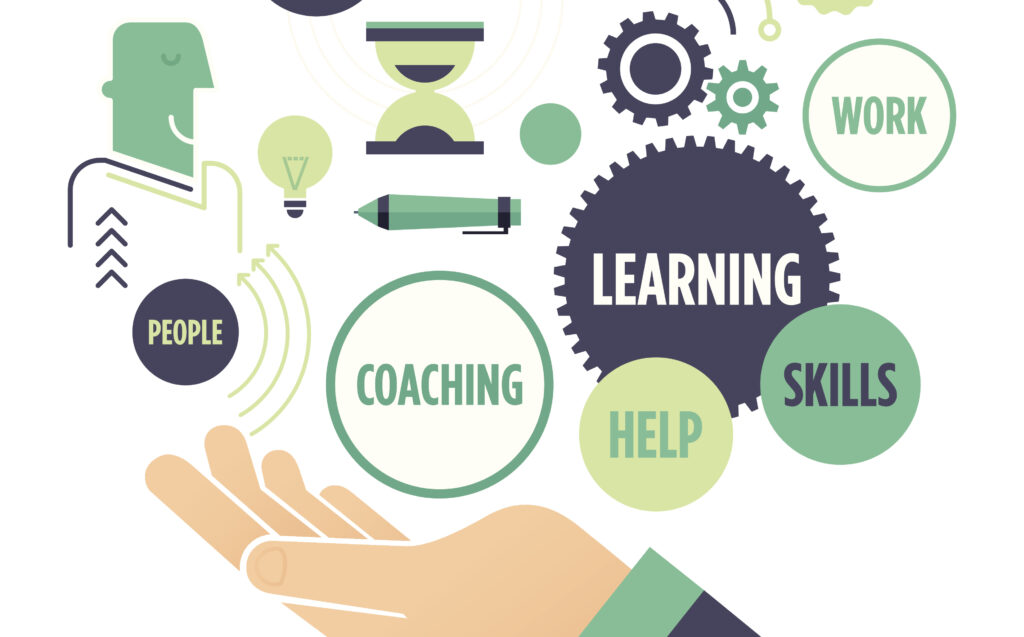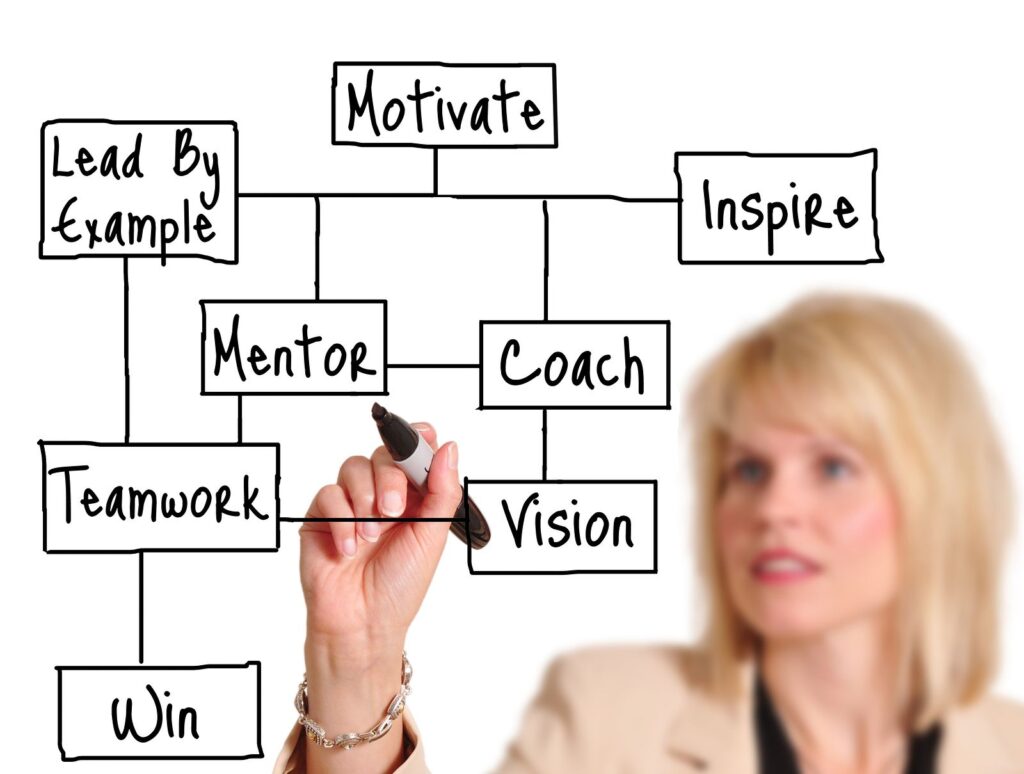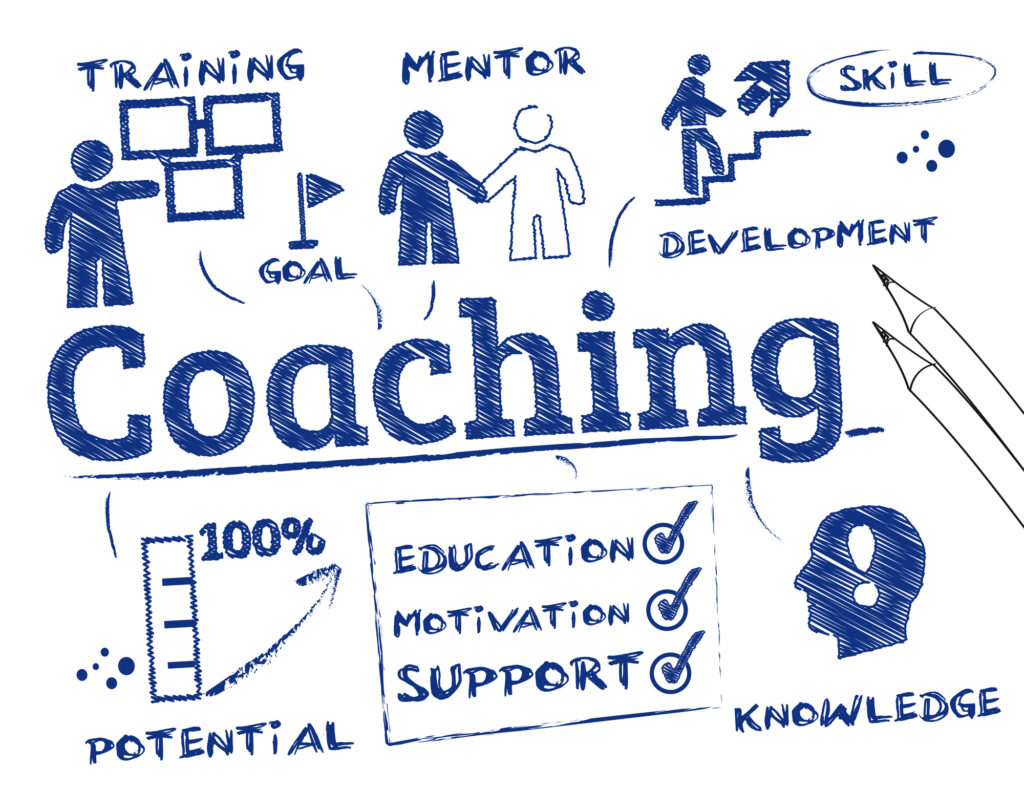Embark on a journey to uncover the transformative power of executive coaching. In this guide, we delve deep into the essence of executive coaching, its benefits, and the process involved. Whether you’re a seasoned executive or a budding entrepreneur, discover how executive coaching can elevate your leadership journey.
Understanding Executive Coaching
Executive coaching is a personalized and professional development process aimed at enhancing the leadership skills, performance, and potential of individuals in executive or leadership roles. Here’s a closer look at what executive coaching entails:
- One on One Guidance: Unlike traditional training or mentoring programs, executive coaching provides individuals with personalized guidance tailored to their specific needs, goals, and challenges. Coaches work closely with clients to identify areas for growth and development.
- Focus on Leadership Development: Executive coaching primarily focuses on developing leadership capabilities, such as strategic thinking, communication skills, decision making, emotional intelligence, and resilience. Coaches help clients hone these skills to become more effective leaders.
- Goal Oriented Approach: Executive coaching is goal oriented, with clear objectives set at the outset of the coaching relationship. Coaches work collaboratively with clients to define measurable goals and create action plans to achieve them.
- Confidential and Trusting Relationship: The coaching relationship is built on trust and confidentiality. Clients feel comfortable discussing sensitive issues, seeking feedback, and exploring potential challenges without fear of judgment.
- Holistic Development: Executive coaching takes a holistic approach to development, addressing both professional and personal aspects of the client’s life. Coaches help clients achieve a balance between their professional responsibilities and personal well being.
- Accountability and Support: Coaches hold clients accountable for their actions and commitments, providing support, encouragement, and constructive feedback along the way. They serve as a sounding board, offering perspective and insights to help clients navigate complex leadership challenges.
Related To: JobDirecto: Guide to Finding Your Dream Job
The Role of an Executive Coach

Executive coaches play a pivotal role in guiding individuals towards achieving their leadership goals and maximizing their potential. Here’s a closer look at the key roles an executive coach fulfills:
- Objective Observer: An executive coach serves as an objective observer, providing valuable insights and perspectives on the client’s leadership style, behavior, and performance. By observing the client in various situations, the coach can identify blind spots and areas for improvement.
- Trusted Advisor: Executive coaches act as trusted advisors, offering guidance, support, and encouragement throughout the coaching process. They establish a confidential and trusting relationship with the client, creating a safe space for open and honest dialogue.
- Accountability Partner: Coaches hold clients accountable for their actions and commitments, helping them stay focused and motivated towards achieving their goals. They track progress, celebrate successes, and provide constructive feedback to keep clients on track.
- Skill Developer: Executive coaches help clients develop and refine essential leadership skills such as communication, decision making, conflict resolution, and emotional intelligence. Through targeted exercises, role playing, and feedback, coaches assist clients in mastering these skills.
- Strategic Partner: Coaches collaborate with clients to develop strategic action plans tailored to their goals and aspirations. They help clients identify priorities, set realistic objectives, and navigate challenges effectively.
- Resource Provider: Executive coaches offer a wealth of resources, tools, and frameworks to support the client’s development journey. Whether it’s articles, books, assessments, or training materials, coaches provide clients with the resources they need to succeed.
- Change Agent: Coaches challenge clients to step out of their comfort zones, explore new perspectives, and embrace change. They encourage clients to stretch beyond their limitations, take calculated risks, and seize opportunities for growth.
Related To: Meet Kase Abusharkh and Amy Berry
Benefits of Working with an Executive Coach
Executive coaching offers a myriad of benefits for both individuals and organizations. Let’s explore how working with an executive coach can lead to positive outcomes:
For the Individual:
- Enhanced Leadership Skills: Executive coaching helps individuals develop and refine essential leadership skills such as communication, decision making, emotional intelligence, and conflict resolution. By honing these skills, individuals become more effective and influential leaders.
- Increased Self Awareness: Coaches facilitate self reflection and introspection, helping individuals gain deeper insights into their strengths, weaknesses, values, and leadership style. Greater self awareness enables individuals to leverage their strengths and address areas for improvement.
- Personalized Development: Executive coaching is tailored to the unique needs and goals of each individual. Coaches work closely with clients to create customized development plans focused on areas that are most relevant and impactful for their growth.
- Improved Performance: Through regular feedback, accountability, and support, executive coaching helps individuals enhance their performance and achieve their professional goals. Coaches provide guidance and encouragement, empowering clients to overcome obstacles and reach their full potential.
- Career Advancement: Executive coaching can accelerate career growth by equipping individuals with the skills, confidence, and strategic mindset needed to advance in their careers. Coaches assist clients in setting and achieving ambitious career goals.
For the Organization:
- Stronger Leadership Pipeline: Executive coaching helps develop a pipeline of strong, capable leaders within the organization. By investing in leadership development, organizations ensure a steady supply of talent to drive future growth and success.
- Improved Employee Engagement: When leaders receive support and guidance through executive coaching, they become more effective in their roles, leading to higher levels of employee engagement and satisfaction. Engaged employees are more motivated, productive, and committed to organizational goals.
- Enhanced Organizational Performance: Effective leadership is critical to organizational success. Executive coaching fosters leadership excellence, leading to improved performance, innovation, and profitability for the organization as a whole.
- Positive Organizational Culture: Executive coaching promotes a culture of learning, growth, and continuous improvement within the organization. When leaders prioritize their own development, it sets a positive example for employees and creates a culture that values personal and professional growth.
- Increased Retention: Investing in the development of leaders through executive coaching can lead to higher levels of employee retention. When individuals feel supported and invested in, they are more likely to remain with the organization for the long term.
Case Study: How Executive Coaching Transformed a Tech Startup

Executive coaching has the power to catalyze transformational change within organizations, as demonstrated by the following case study of a tech startup:
Background:
- Company Profile: The tech startup in question was a rapidly growing company in the software development industry, facing challenges related to leadership effectiveness, team dynamics, and strategic decision making.
- Leadership Challenges: The startup’s leadership team struggled with communication breakdowns, conflicting priorities, and a lack of alignment on the company’s vision and goals. This led to inefficiencies, low morale, and a stagnant growth trajectory.
Engagement of an Executive Coach:
- Identification of Needs: Recognizing the need for intervention, the startup’s CEO decided to engage the services of an executive coach. The coach conducted an initial assessment to understand the organization’s challenges, goals, and areas for improvement.
- Customized Coaching Plan: Based on the assessment findings, the executive coach developed a customized coaching plan tailored to the startup’s specific needs and objectives. The plan included individual coaching sessions for key leaders, team building workshops, and strategic planning sessions.
Implementation and Results:
- Leadership Development: Through one on one coaching sessions, the executive coach worked with the startup’s leaders to enhance their leadership skills, improve communication, and foster collaboration. Leaders gained greater self awareness, learned effective leadership techniques, and developed strategies to overcome obstacles.
- Team Alignment: The coach facilitated team building workshops to improve collaboration and alignment among the startup’s leadership team. By fostering open communication, trust, and respect, team members were able to overcome conflicts and work towards common goals more effectively.
- Strategic Planning: The executive coach guided the startup’s leadership team through a strategic planning process, helping them clarify their vision, mission, and strategic priorities. Together, they developed actionable plans to drive growth, innovation, and market expansion.
Results and Impact:
- Improved Performance: As a result of executive coaching, the startup experienced significant improvements in performance, productivity, and morale. Leaders became more effective in their roles, teams worked more cohesively, and the organization achieved greater clarity and focus.
- Accelerated Growth: With enhanced leadership capabilities and a clear strategic direction, the startup was able to accelerate its growth trajectory. It expanded its customer base, launched new products and services, and entered new markets with confidence.
- Positive Culture Change: Executive coaching contributed to a positive culture change within the organization, characterized by open communication, collaboration, and a shared sense of purpose. Employees felt more engaged, motivated, and aligned with the company’s mission and values.
Related To: Buying XEM P2B
Who Can Benefit from Executive Coaching?
Executive coaching is a versatile tool that can benefit a wide range of individuals across various industries and roles. Let’s explore who can benefit from executive coaching and the common goals and areas coaches help with:
Common Goals and Areas Coaches Help With:
- Leadership Development: Executives, managers, and emerging leaders can benefit from executive coaching to enhance their leadership skills, such as communication, decision making, delegation, and conflict resolution. Coaches work with clients to develop a leadership style that is authentic, effective, and adaptable to different situations.
- Career Advancement: Professionals seeking career advancement can benefit from executive coaching to clarify their career goals, develop a career strategy, and navigate career transitions. Coaches provide support, guidance, and resources to help clients achieve their career aspirations and unlock new opportunities.
- Performance Improvement: Individuals looking to improve their performance at work can benefit from executive coaching to identify areas for improvement, set performance goals, and develop action plans to achieve them. Coaches offer feedback, accountability, and support to help clients overcome obstacles and reach their full potential.
- Work Life Balance: Executives and professionals struggling to balance their work and personal lives can benefit from executive coaching to create a more balanced and fulfilling lifestyle. Coaches help clients prioritize their time, set boundaries, and manage stress effectively to achieve greater harmony between work and life.
- Transition Support: Individuals going through career transitions, such as promotions, job changes, or retirement, can benefit from executive coaching to navigate these transitions successfully. Coaches provide guidance, encouragement, and practical strategies to help clients adapt to change and thrive in new roles or environments.
- Conflict Resolution: Leaders and team members dealing with interpersonal conflicts or challenging work dynamics can benefit from executive coaching to improve their conflict resolution skills, build stronger relationships, and foster a more collaborative work environment. Coaches facilitate difficult conversations, promote understanding, and help parties find mutually beneficial solutions.
- Personal Development: Executives and professionals looking to enhance their personal effectiveness and well being can benefit from executive coaching to develop self awareness, resilience, emotional intelligence, and other personal qualities. Coaches support clients in exploring their values, beliefs, and motivations to live more fulfilling and meaningful lives.
How to Find the Right Executive Coach
Finding the right executive coach is crucial for a successful coaching experience. Here are steps to help you find the right executive coach:
Clarify your Goals:
- Self Reflection: Take time to reflect on your goals, challenges, and aspirations. What specific areas of your leadership or career do you want to focus on? Clarifying your objectives will help you find a coach with the right expertise and experience.

Research Potential Coaches:
- Credentials and Experience: Look for coaches with relevant credentials, such as certification from reputable coaching organizations (e.g., International Coach Federation). Consider coaches with experience working with clients in your industry or with similar career challenges.
- Reviews and Recommendations: Seek recommendations from colleagues, mentors, or trusted professionals who have worked with executive coaches. Look for reviews or testimonials from past clients to gauge the coach’s effectiveness and suitability.
Conduct Interviews:
- Initial Consultations: Schedule initial consultations with potential coaches to discuss your goals, expectations, and coaching approach. Use this opportunity to assess the coach’s communication style, expertise, and rapport building skills.
- Ask Questions: Prepare a list of questions to ask the coach about their background, coaching philosophy, process, and success stories. Pay attention to how the coach responds and whether their approach aligns with your needs and preferences.
Assess Fit:
- Chemistry and Compatibility: Trust and rapport are essential for a productive coaching relationship. Consider whether you feel comfortable and understood by the coach. Look for a coach who demonstrates empathy, listening skills, and genuine interest in your success.
- Alignment with Values: Evaluate whether the coach’s values, ethics, and coaching philosophy align with your own. A shared understanding of what success looks like and how to achieve it is crucial for a fruitful coaching partnership.
Review Coaching Agreement:
- Terms and Conditions: Review the coaching agreement carefully to understand the coach’s fees, scheduling, confidentiality, and termination policies. Ensure that both parties are clear on expectations and responsibilities before committing to coaching.
- Trial Sessions: Some coaches offer trial sessions or short term engagements to test the waters before committing to a longer coaching relationship. Take advantage of these opportunities to assess the coach’s effectiveness and suitability.
Trust Your Instincts:
- Intuition: Trust your instincts when making the final decision. Choose a coach who resonates with you on a personal and professional level and whom you believe can support you in achieving your goals.
The Coaching Process Explained
The coaching process is a structured and iterative journey designed to support individuals in achieving their goals and maximizing their potential. Let’s explore the key stages of the coaching process:
Related To: PedroVazPaulo Executive Coaching
Initial Assessment
- Goal Setting: The coaching process typically begins with an initial assessment phase, where the coach and client collaborate to clarify goals, objectives, and expectations for the coaching relationship. This involves identifying areas for development, defining desired outcomes, and establishing benchmarks for success.
- Assessment Tools: Coaches may use various assessment tools, such as personality assessments, 360 degree feedback, or self assessment questionnaires, to gather data and insights about the client’s strengths, weaknesses, preferences, and leadership style.
Goal Setting
- SMART Goals: Once goals are identified, the coach and client work together to set SMART (Specific, Measurable, Achievable, Relevant, Time bound) goals that align with the client’s aspirations and organizational objectives. These goals serve as the roadmap for the coaching journey and provide clarity and focus for the client’s efforts.
Action Planning
- Strategic Planning: With goals established, the coach and client develop a strategic action plan outlining the steps, strategies, and resources needed to achieve the desired outcomes. This involves breaking down goals into smaller, manageable tasks, setting timelines, and identifying potential obstacles and solutions.
Coaching Sessions
- One on One Sessions: Coaching sessions typically take place on a regular basis, either in person, over the phone, or via video conferencing. During these sessions, the coach and client engage in focused conversations, exploring challenges, brainstorming ideas, and identifying opportunities for growth.
- Exploration and Reflection: Coaches use powerful questioning techniques to encourage self reflection, insight, and awareness in clients. Through deep listening and inquiry, coaches help clients gain clarity, challenge limiting beliefs, and explore new perspectives.
Action and Reflection
- Implementation: Between coaching sessions, clients take action on their goals and commitments, applying insights gained from coaching conversations to real world situations. Coaches provide ongoing support, encouragement, and accountability to help clients stay on track and overcome obstacles.
- Reflection: Reflection is a critical component of the coaching process, allowing clients to pause, review progress, and assess outcomes. Coaches facilitate reflection by asking probing questions, encouraging self assessment, and celebrating achievements.
Progress Review
- Assessment of Progress: Periodically, the coach and client review progress towards goals, evaluate effectiveness of strategies, and adjust action plans as needed. This ensures that coaching remains aligned with the client’s evolving needs and priorities.
Closure and Next Steps
- Closure: As the coaching relationship comes to an end, the coach and client reflect on the journey, celebrate achievements, and acknowledge growth and development. Closure sessions provide closure and closure to the coaching relationship, allowing clients to transition confidently to the next phase of their journey.
- Next Steps: Coaches may work with clients to identify next steps and ongoing support mechanisms to sustain progress and continue their development journey beyond coaching.
Getting Started with Executive Coaching

Embarking on an executive coaching journey is an exciting opportunity for personal and professional growth. Here’s how to get started:
Assess Your Readiness:
- Self Reflection: Take time to reflect on your readiness and willingness to engage in the coaching process. Consider your goals, motivations, and commitment to personal and professional development.
- Openness to Feedback: Executive coaching requires a willingness to receive feedback, challenge assumptions, and explore new perspectives. Assess your readiness to engage in candid and reflective conversations with your coach.
Identify your Goals:
- Clarity of Objectives: Clarify your goals and objectives for executive coaching. What specific areas of your leadership or career do you want to focus on? Be clear about what you hope to achieve through the coaching process.
- SMART Goals: Set SMART (Specific, Measurable, Achievable, Relevant, Time bound) goals that are aligned with your aspirations and organizational priorities. These goals will serve as the foundation for your coaching journey.
Research and Select a Coach:
- Research Coaches: Conduct research to identify potential executive coaches who specialize in your areas of interest or expertise. Consider factors such as credentials, experience, coaching approach, and compatibility.
- Initial Consultation: Schedule initial consultations with prospective coaches to discuss your goals, expectations, and coaching needs. Use this opportunity to assess the coach’s expertise, communication style, and fit with your personality and preferences.
Establish Coaching Agreement:
- Define Expectations: Work with your chosen coach to establish a coaching agreement that outlines expectations, goals, responsibilities, and logistics of the coaching relationship. Clarify confidentiality, scheduling, fees, and termination policies.
- Mutual Commitment: Ensure both you and your coach are committed to the coaching process and aligned on the desired outcomes. Agree on a timeline and frequency for coaching sessions, as well as methods for tracking progress and evaluating success.
Prepare for Coaching Sessions:
- Preparation: Prior to each coaching session, take time to prepare by reflecting on your progress, challenges, and priorities. Consider what specific topics or issues you want to discuss with your coach and what outcomes you hope to achieve.
- Openness and Vulnerability: Approach coaching sessions with an open mind and a willingness to be vulnerable. Be prepared to explore uncomfortable topics, challenge assumptions, and consider alternative perspectives.
Act on Insights and Feedback:
- Action Oriented Approach: Use insights gained from coaching sessions to take action and implement positive changes in your behavior, mindset, and approach to leadership. Be proactive in applying feedback and experimenting with new strategies.
- Accountability: Hold yourself accountable for following through on commitments and action plans developed in coaching sessions. Use progress reviews and reflection exercises to track your progress and make adjustments as needed.
Embrace Continuous Learning:
- Lifelong Development: View executive coaching as part of your ongoing journey of learning and growth as a leader. Stay open to new ideas, seek out opportunities for development, and continue to invest in your personal and professional development beyond coaching.
Conclusion
Executive coaching offers a powerful pathway for individuals to unlock their full potential, enhance their leadership capabilities, and achieve their professional goals. Through a structured process of goal setting, reflection, and action, executive coaching empowers individuals to overcome challenges, maximize their strengths, and drive meaningful change in their organizations.
By investing in executive coaching, individuals and organizations can cultivate a culture of continuous learning, development, and innovation, ultimately leading to greater success and fulfillment. As we navigate the complexities of today’s business landscape, executive coaching remains a valuable resource for leaders seeking to thrive in an ever evolving world.
FAQs
How long does executive coaching typically last?
Executive coaching durations vary based on individual needs and goals. Engagements can range from a few months to over a year, with session frequency and duration determined collaboratively between the coach and client.
What qualifications should I look for in an executive coach?
Look for coaches certified by recognized organizations like the International Coach Federation (ICF). Consider their experience, expertise, and success with similar clients. Effective communication and the ability to tailor coaching to your needs are also crucial.
Can executive coaching be customized to address specific challenges or industries?
Yes, executive coaching is highly customizable. Coaches adapt their approach to address individual challenges and align with the client’s industry, culture, and leadership style. Whether it’s skill development, career transition, or organizational issues, coaching can be tailored to meet specific needs.







